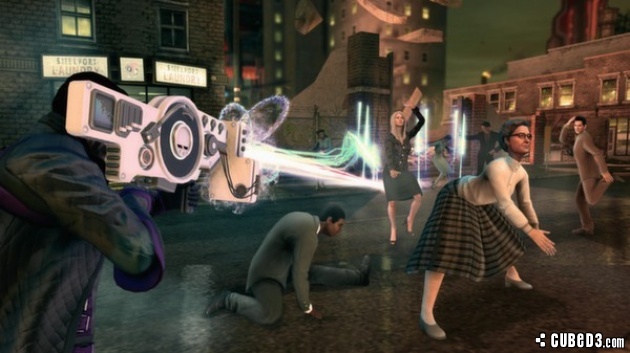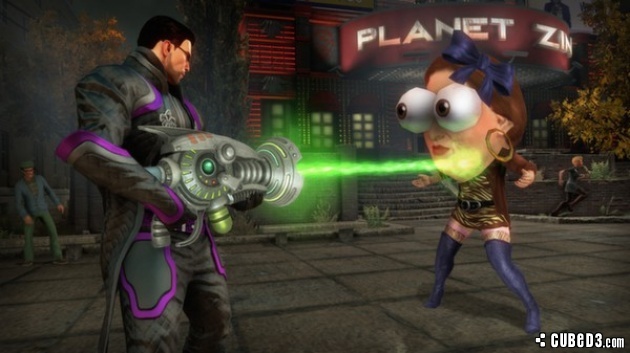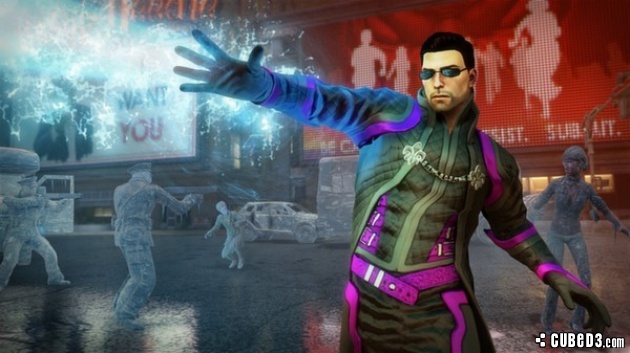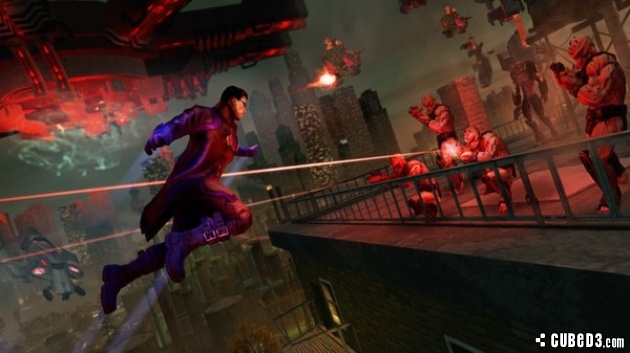Saints Row IV (PC) Review
By Jordan Hurst  26.08.2014
26.08.2014

Saints Row IV may have the best open-world sandbox gameplay in existence. That doesn't mean it's necessarily the best game overall - there's more to it than the sandbox, and not all of it holds up - but it does mean it's a hell of a lot of fun to pick up and play. Almost all of the credit for this achievement can be handed to the game's newfound identity, which existed only in infant form in previous games, before seemingly reaching adolescence in Saints Row: The Third. Having finally shaken off the last traces of the "Grand Theft Auto clone" moniker the series has worn since its 2006 debut, Saints Row IV is finally ready to show the world its true colours. Specifically, the colours of a colossal toy box that goes around beating up other toys with universal irreverence.
What makes the game's identity so important to its quality is that it was formed by absorbing other, generally good sandbox game concepts, and filling in the cracks in the execution that originally held them back. Now, in addition to being Grand Theft Auto with a decent control scheme, it's also Crackdown without the cognitive dissonance, and Prototype with a sense of humour. In the process, Saints Row IV has become something totally unique, because while there are plenty of sandbox crime games out there, none of them include a rifle that can be re-skinned to look like a Super Soaker, and none of them include super-powered alien battles set to "The Touch." Sound ridiculous? That's not even scratching the surface. With this instalment, Volition realized what Assassin's Creed demonstrated years ago: if a game is set in an explicitly game-like simulation, all kinds of outlandish video game tropes can be easily justified, and developers are free to run wild with whatever crazy ideas cross their minds. Of course, Saints Row IV takes the concept much, much farther, supplementing the existing running, shooting, and driving gameplay with an array of cartoonish weapons and superpowers, reality-bending story missions, and complete disregard for the fourth wall.
If video games were psychiatric conditions, Saints Row IV would be ADHD. It's impossible to even walk down the street without tripping over collectibles, customisation options, mini-games, and side-quests, which range from racing at super speed, to eliminating overpowered glitch characters, to telekinesis target practice. This is partly because the open world is rather condensed despite the sheer amount of content - a wonderful antithesis to the enormous but shallow settings of most sandbox games. Getting around the simulated city of Steelport is also as efficient and enjoyable as possible, thanks to the ability to quickly scale buildings and glide from rooftop to rooftop. Most crucially, however, all of Saints Row IV's diversions are there for the player's entertainment, instead of being there to artificially inflate the play time. Even the cars, which are rendered obsolete by the protagonist's superpowers, are fun to drive, thanks to physics that favour usability over realism, and an experience system that offers bonuses for everything from driving in the wrong lane to bailing out and using the vehicle as a torpedo. Finally, players who decide to go on killing sprees (because who doesn't every now and then?) will find that the setting's looser grip on reality allows there to be much more enemy variety than in other games of this type.

The other most notable aspect of Saints Row IV is its tendency to reference and mock everything, especially other video games, both specific and general. There's almost no object or piece of dialogue that isn't recalling another piece of pop culture. There's even a shout-out to Day of the Tentacle, just to demonstrate how far the references reach. Fortunately, the game's humour is not only devoted to pointing out the existence of other intellectual properties; there's lots of legitimate parody here, too. Of particular note is a hilarious riff on Mass Effect's laboured sex scenes, wherein each crew member is immediately and effortlessly "romanceable" with zero narrative impact. Much of the game is also an extended jab at The Matrix, and an entire level is dedicated to a perfect imitation of Streets of Rage, of all things. Another level tries the same for Metal Gear Solid, but feels more forced, possibly because Metal Gear Solid is already kind of its own parody.
The usual stock phrase for this sort of thing is that the game "doesn't take itself seriously," but in this case, it actually seems like "itself" is the only thing the game takes seriously. Huge chunks of the story, not to mention some of the comedy, will mean absolutely nothing to a player who is unfamiliar with the previous games. Imagine the Zelda series' affection for Ocarina of Time, multiplied by three past releases - that's the level of self-indulgence Saints Row IV is swimming in. The sad thing is that it's clearly done with good intentions; there's lots of solid character development, including a fantastic reconciliation of one character's drastically different personalities between games 2 & 3, but the devotion to continuity is extremely out of place in a game with such psychotic personality. In fact, the story as a whole may as well be taking place in a separate game from the sandbox.

The game begins with the leader of the Third Street Saints gang (the player character) becoming President of the United States, an absurd event which immediately becomes a footnote to the rest of the plot when aliens invade the planet, and connect its inhabitants to an enormous simulation designed to mentally break them into subservience. After escaping their initial captivity, the player is dropped into a recreation of Steelport from Saints Row: The Third, and vows to disrupt the simulation as much as possible from within in order to fully escape and take revenge on the alien menace. It's a fitting setup for gameplay, but its indecisive tone is distracting. Early in the game, a major atrocity is committed, and it's only dwelt on for thirty seconds before becoming a grim running joke - as it should be in a game like this - but elsewhere, characters are rescued by descending into simulations created from their personal nightmares. Some of these are funny, and all of them are creative, but there's a disturbing undercurrent to most of them that's quite jarring in context. Saints Row was always known for its self-awareness, but now it looks like the only aspect of itself that it's aware of is its status as a video game.
While it's obvious that the sandbox was the focus of development, the campaign gameplay doesn't seem to have been sacrificed in the process, for once. For one thing, it's surprisingly well balanced. It's possible that this is only because it frequently takes away super powers due to taking place in the "real world," but even the missions that happen in the simulation are suitably swarming with enemies, so even though the player can shoot fire out of their hands and has a gun that shoots black holes, they rarely feel too overpowered, which is quite an accomplishment. The final boss is a special highlight, as it's obviously designed to be faced after accumulating many upgrades from playing around in the sandbox, encouraging players to experience the best part of the game, while also ensuring that even those who insist on 100% completion won't be able to flatten the game's final obstacle without some difficulty. It is also possible that the developers were only able to juggle the sandbox and the campaign because the city of Steelport is almost identical to its incarnation in the previous game. Reusing assets like this usually isn't the best design practice, but it works here, because while the city is largely the same, everything the player can do in it, including how they get around, is completely different, so the placement of buildings and streets is irrelevant.

If the gameplay falters at all, it's in the polish department. The game is such a jumble of mechanics and systems that almost everything is slightly imperfect. For one thing, while its controls are still much more agreeable than the stiff hyperrealism of Grand Theft Auto, the game also inherited the slippery confusion of Prototype's controls, which is unsurprising, since it inherited every other aspect of Prototype's controls. Also unsurprising for a game with this many features is that the control scheme is overly complicated. There's something seriously wrong with a setup in which pressing, double-tapping, and holding D-pad directions do three different things. Furthermore, the player is constantly pummelled by lumbering knockback physics, causing painful flashbacks to the worst part of Volition's own Red Faction: Guerilla. There's also a co-op multiplayer mode that was very clearly added as an afterthought. There are very few gameplay features that justify its inclusion, it accommodates quick time events and cut-scenes in strange ways that sometimes ignore player two and sometimes don't, and it's completely broken unless both players start with two entirely new characters. Of course, it's still mildly entertaining to include a partner in some murderous rampaging, but better implementation would have made co-op a key feature, rather than a tacked-on extra.
If the asset reuse is excused, Saints Row IV is quite a pretty game. It's not going to win any awards for visuals, but its slightly exaggerated character designs, excellent animation, and array of shiny particle effects make for quite an appealing aesthetic. It also uses its setting for all it's worth by adding a variety of glitchy graphical touches throughout (possibly to hide load times and pop-ins; if so, it's doing a great job). The licensed part of the soundtrack that can be played on the in-game radio (even on foot, since cars aren't very useful anymore) is full of shameless guilty pleasures, as well as reggae and classical selections for maximum irony. The soundtrack's original compositions are relatively low-key - mostly orchestral pieces for boss battles and celebratory dubstep for completed missions. It's not the spectacular combination of the two that Far Cry 3 showcased, but it does its job very well regardless. Oh, and yes, there is a gun that shoots weaponised bass drops, and yes, it is awesome. Finally, the game's voice acting is excellent, especially considering how much of it there is, although the "low health" sound effect is simultaneously annoying and not urgent enough to actually alert players to their falling health.

Cubed3 Rating
Very Good - Bronze Award

Saints Row IV is everything a sandbox game should be: a wacky, anarchic playground built on a foundation of cathartic violence and freeform motion. Sandbox gameplay is one of the most commonly misunderstood facets of game design, but Volition has proved that it knows what makes it tick, creating a game that's most fun when it's aimlessly dived into. Its mechanics are too scattershot to ever be perfect, but the game's personality is such that it wouldn't want to be perfect. It only wants to provide as much primitive entertainment as possible with the tools available to it, which it does. If there's a good way to be juvenile and dumb, this is it.

![]() 7/10
7/10
![]() 0
(0 Votes)
0
(0 Votes)
 Out now
Out now  Out now
Out now  Out now
Out now  Out now
Out now Comments
Comments are currently disabled

 Sign In
Sign In Game Details
Game Details Subscribe to this topic
Subscribe to this topic Features
Features





 Top
Top

